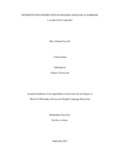
Please use this identifier to cite or link to this item:
https://hdl.handle.net/20.500.14301/469| Title: | Differentiated Instruction in English Language Classroom: A Narrative Inquiry |
| Authors: | Gyawali, Shiva Kumar |
| Citation: | Gyawali,S.K.(2023).Differentiated instruction in English language classroom: A narrative inquiry. |
| Issue Date: | Sep-2023 |
| Publisher: | Kathmandu University School of Education |
| School: | SOED |
| Department: | DOLE |
| Level: | M.Phil. |
| Program: | Master of Philosophy (MPhil) in English Language Education |
| Abstract: | The study explores the differentiated instruction applied in English language classrooms. The stories are asked to find perceptions and practices of differentiated instruction in their practicality. In the process of conducting this study, I reviewed the relevant literature on differentiated instruction and its influence on teaching and learning, with a particular focus on the learning of the English language in the context of Nepal. For the theoretical insight of the present study, I adopted the principles of social constructivism. This theory informed me that all children’s cognitive development is not the same because they are from different cultural, religious and social backgrounds. In this regard, my theory is insightful in addressing the issues of learners' differentiation. During this course of study, I employed interpretivism as a research paradigm. I followed the principles of qualitative research in the entire process of this research, right from the time of information generation to the final preparation of the dissertation. There were four research participants in my study. They were selected from Butwal sub-metropolitan city, Rupandehi. The information was generated through a series of interviews. Being conscious of multiple realities because of the varied context each learner brings in their life, I used narrative inquiry as a method of inquiry to represent the subjective experiences of the learners and their world. Therefore, the ontology for this research is socially constructed. Some of the explored experiences in this study are whole-class work, group work, pair work, critical thinking skills, project work, matching the class tasks with learners' ability, giving students agency, extra care for struggling and extra duty for bright learners, to be a friend to the slow learners and implementation of continuous assessment. I have concluded my study with the major themes of differentiated instruction: shifting acquaintance with teachers, embracing diversity, cooperation as a learning tool, acceptance of diverse knowledge, partial adoption of alternative assessment and intervention beyond the classroom. I had thought that there used to be teacher-centered teaching where teachers used to select the subject matter and teaching techniques, but I knew that there used to be physical punishment in the school by their teachers as captives get punishment in custody. I had conceptualized that extroverted student are better at learning the language, but I learned that they have similar capabilities. I had regarded at least model schools are applying for differentiated instruction in the classroom but differentiated instruction seems still difficult for them as they have overcrowded classrooms. I found that there were greater changes in learners’ minds regarding their sharing culture than I had imagined earlier. I found project work a more beneficial with a broader range of caring, even family members in collaborating work. I found some misleading ideas as teachers often show a farmer's image in shabby clothing, while they show a well-dressed picture of a businessman. Students have no feeling that gender discrimination is deeply rooted in their hearts. However, gender inequality exists in the form of discrimination rooted in family behaviour and societal talk. Differentiated instruction requires a deep understanding of students' needs, curriculum flexibility, and managing multiple instructional paths simultaneously. It often involves collaborative activities where students work in groups or pairs. This fosters peer-to-peer learning, communication skills, and cooperative problem-solving, enhancing classroom dynamics. |
| URI: | https://hdl.handle.net/20.500.14301/469 |
| Appears in Collections: | Dissertation |
Files in This Item:
| File | Description | Size | Format | |
|---|---|---|---|---|
| Shiva Gyawali_Finalized Thesis Nov 2023.pdf | 744.96 kB | Adobe PDF |  View/Open |
Items in DSpace are protected by copyright, with all rights reserved, unless otherwise indicated.